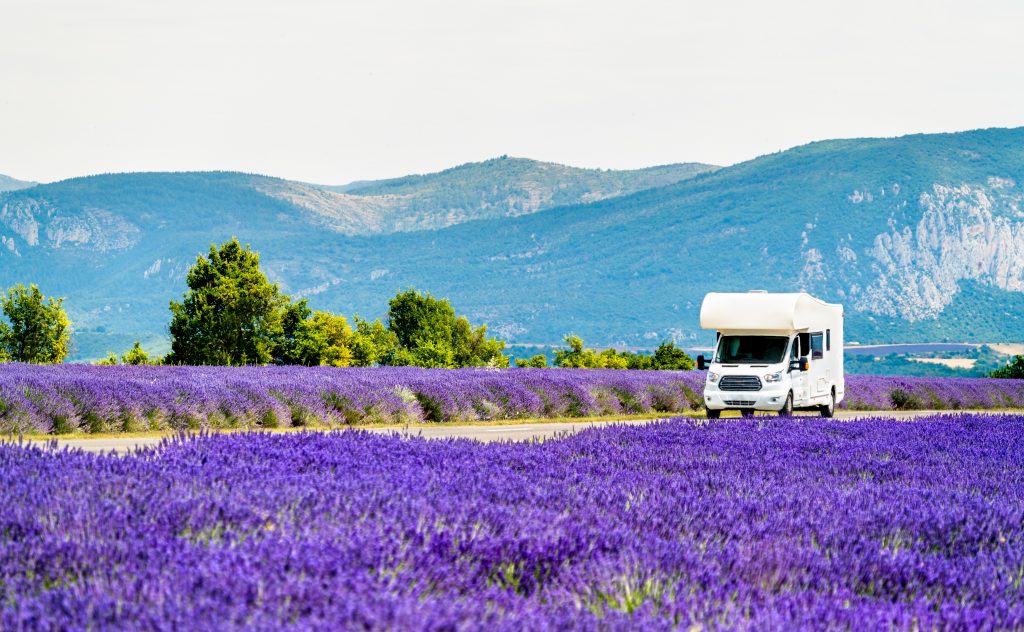Driving in France can be intimidating, confusing and a bit baffling at times. But if you follow these 11 tips, you’ll be cruising French roads like a local.
Rent a car in France
You can wait until you get to France to rent a car, but you’ll get a better price and more options if you book earlier, before your trip. Consider renting your car for a longer period to get a cheaper rate. Take into account the price of overnight parking and all the other expenses you may encounter.. Besides, the cost of fuel in Europe is much higher than in the US.

Don’t drive a stick-shift
The majority of cars in France are stick-shift, not automatic. That means cars with automatic gearboxes are often limited and cost more. Another good reason to book in advance.
Technically you need an international driving permit
When you rent a car, you probably won’t be asked for it. But when you are stopped, you’re supposed to have it along with your normal license.
Have a good map
 On the road in France, signs often won’t indicate north, south, east or west. Instead, they’ll use a city indicating the direction. So if you want to drive north from Marseille for example, you might look for a sign for Paris or Lyon as you might expect. This can be incredibly confusing for anyone not intimately familiar with French geography. Especially when you get into smaller roads which often indicate their direction with smaller towns and villages, we recommend having a good map or a GPS.
On the road in France, signs often won’t indicate north, south, east or west. Instead, they’ll use a city indicating the direction. So if you want to drive north from Marseille for example, you might look for a sign for Paris or Lyon as you might expect. This can be incredibly confusing for anyone not intimately familiar with French geography. Especially when you get into smaller roads which often indicate their direction with smaller towns and villages, we recommend having a good map or a GPS.
Know the rules of the French road priority
The old French system was to give priority to all traffic coming from the right. This still applies at unmarked crossroads in the countryside and small villages as well as on minor streets inside cities. Most other road crossings have some kind of priority system implemented.
The concentration of alcohol in blood should be more than 0.5 grams per liter. On motorcycles and scooters, helmets are required for both driver and passenger. The use of seat belts is mandatory at all times and children must be at least age of 10 to sit in the front seat. Child seats are mandatory for children up to age 4.
Fines for traffic violations are collected on the spot in either euros or traveler’s checks. The fines for not wearing a seat belt, driving through a red light, driving while intoxicated and driving without a license are extremely high and can even include the confiscation of your vehicle.
Speed limit
 All French roads from city streets to highways have speed limits usually indicated by a white and red circle with the number by km/h written in the center. Over the last few years, France has installed about 2,000 stationary speed radars. All fixed radars should have a warning sign with a speed limit posted under it to let you know to slow down.
All French roads from city streets to highways have speed limits usually indicated by a white and red circle with the number by km/h written in the center. Over the last few years, France has installed about 2,000 stationary speed radars. All fixed radars should have a warning sign with a speed limit posted under it to let you know to slow down.
Tolls
Highway in France known as Auto routes are marked by blue signs with the letter. A charges for using Auto routes are payable at the frequent toll gates and can get rather expensive. The cost of a motorway travel for a car is about 1 euro for every 10 miles.
If you have more time and don’t want to travel on auto routes, you could use the free map from gas station which shows all alternative routes across the country. 
Parking
look for a blue sign with a “P” to park. Parking can be a pain, especially in big cities. France is where you learn what bumpers are for and people do use them. They squeeze in and out of spaces all day long especially in big cities. Arcing is strictly regulated in urban areas and is permitted only in spaces painted in white. Those marked in yellow are reserved for commercial and official vehicles.
Payment machines are located at intervals along the streets where coupons may be purchased for fifteen minutes to two hours of parking time. You must leave the coupon inside the vehicle, visible through the windshield on the driver side.
Many downtown areas have modern and secure underground parking structures. Rates are higher than parking on the street but they do offer more space and longer parking areas.

Black Saturday
Black Saturday is the worst traffic day of the year.The worst is the last Saturday of July and the first Saturday of August. This is the day when tourists are either coming from or going to the vacation. Try to leave early or travel on another day.
French breathalyzer test
In France, the blood-alcohol level limit is 0.5 grams per litre.
Items for your vehicles
All vehicles on French roads must have one yellow safety jacket and one warning red triangle. If you’re driving a car and don’t have both, a yellow safety jacket or a red triangle, you could be face a fine up to 135 euros.


